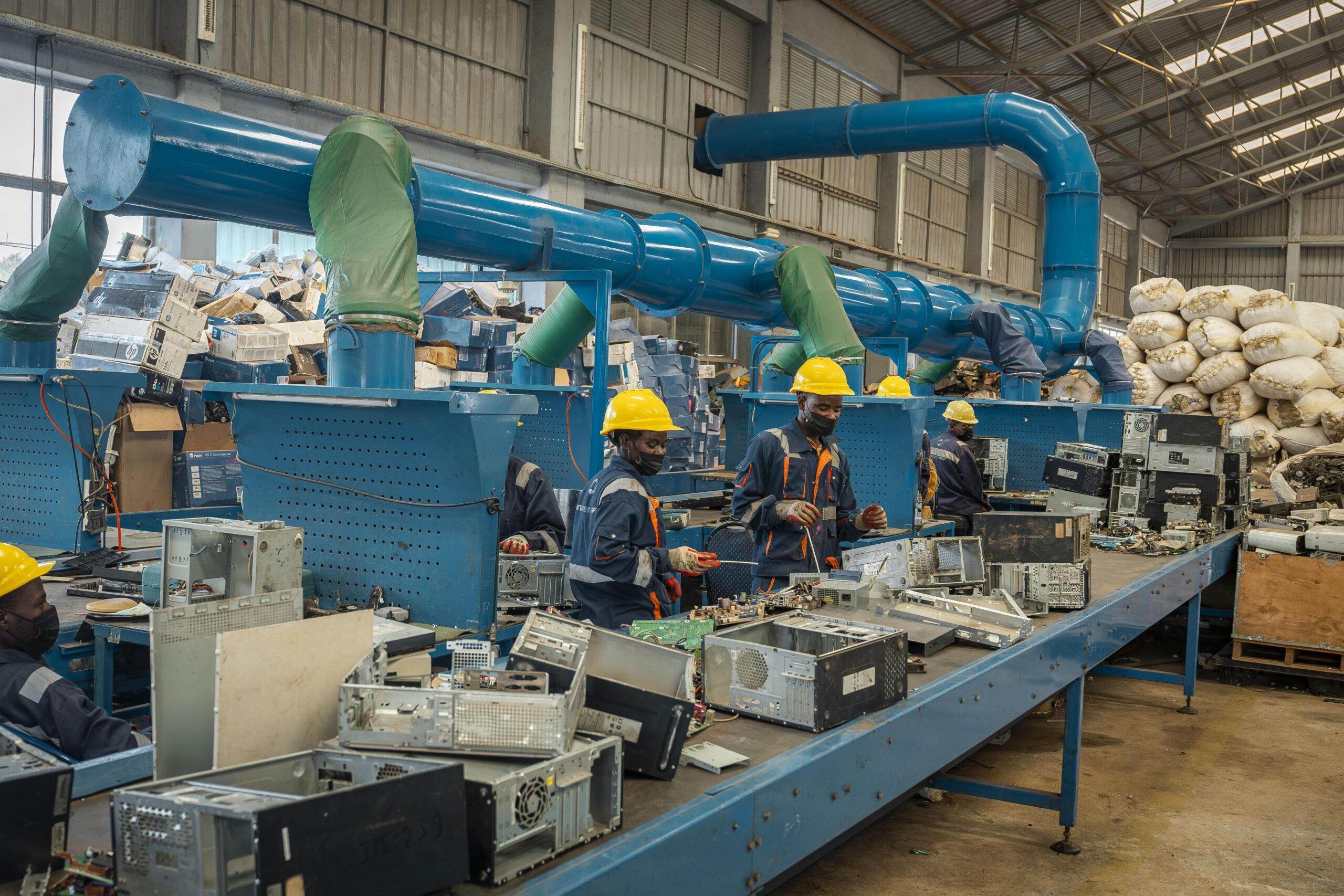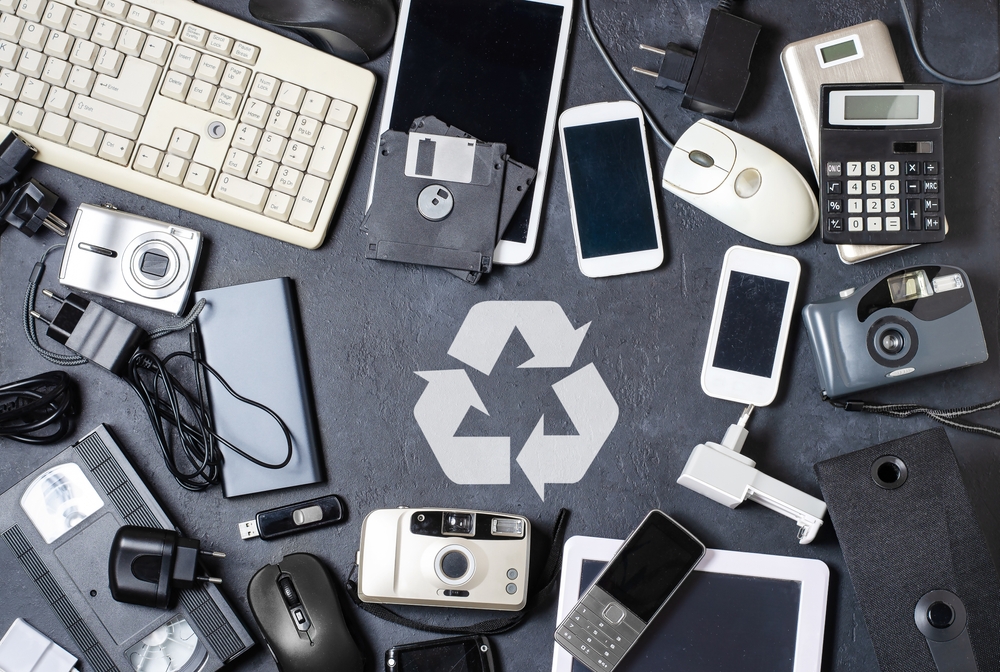Young Rwandans take the lead in e-waste handling

Old phones, computers, and other electronics can be dangerous if not thrown away properly. They contain harmful chemicals that can hurt people and the environment. In Rwanda, young people are doing something about it.
IMANI Anto Deborah, 28, lives in Kacyiru, Gasabo District. For the past five years, she has been working with Enviroserve Rwanda, a private company that collects and recycles old electronic items.
“I studied Electronics and Telecommunications at IPRC Huye. In 2019, I did a six-month internship, and then I got a job here,” Deborah explained. “I help collect old electronic items like phones, TVs, and computers at our office in Gikondo. We sort them into bins, and when the bins are full, they are sent to the factory for proper recycling.”
During her internship, Deborah learned how to fix broken electronics and how to recycle them safely.
“These old electronics have hazardous pieces, really dangerous to our health and the environment at large. Instead of keeping them at home where they can leak harmful stuff, people should bring them to safe collection points,” she said.
Deborah believes that recycling electronic waste helps protect the planet.
“Climate change is caused by not taking care of the environment. Just like we separate household waste, we should also separate and properly dispose of electronic waste,” she added.
NTWALI Revérièn, 32, also works as a supervisor at Enviroserve Rwanda. In 2022, he began with a six-month internship and later got a job as an e-waste agent in Musanze.
“I studied IT and computer science. I applied for a six-month internship, and after that, the company hired me. We educated local communities about the dangers of e-waste and helped collect it so it could be safely recycled,” he said.
“Before, I thought it was just a job. But after learning about how dangerous e-waste is, I put the best of myself into it”, he said. “I’m happy the government is taking this issue seriously to keep our country clean and safe.”
Recycling E-Waste, Empowering Youth
With nearly seven years of experience, Enviroserve Rwanda Green Park is a private company that collects and recycles old electronic and electrical items. The company promotes green growth and the reuse of materials, known as the circular economy. It is leading e-waste management in East Africa and operates the region’s only modern recycling plant for electronic waste.
Since beginning operations in 2018, Enviroserve Rwanda is strongly committed to youth employment, with approximately 90% of its workforce made up of young men and women.
In August 2023, Olivier Mbera, the Country Manager, spoke to Rwanda Television about the dangers posed by old or unused electronic devices, including mobile phones.
“In phone batteries, there are chemicals called cadmium. Sometimes, when phones are stored for a long time, they begin to swell, and these chemicals start to leak. Breathing in these substances can have negative effects on health,” he explained.
He further warned that keeping such devices at home unknowingly continues to harm people’s health.
“That is why we advise people not to keep old electronic devices at home once they are no longer needed, because they can affect health and pose risks to the entire family,” Mbera added.

Speaking about the process, Mbera said that when devices reach the recycling plant, toxic substances harmful to the environment and human health are safely extracted using a latest generation system.
“We have methods to handle and protect people from harmful chemicals,” he said. “We use machines to remove the dangerous substances and work with partners who use high-temperature incinerators to destroy them safely,” he said.
Human Health and Environmental Risks from E-Waste
Findings from the Seventh Integrated Household Living Conditions Survey (EICV7) show a significant increase in mobile phone ownership across Rwandan households — rising from 67% in 2017 to 85% in 2024.
While this growth reflects improved access to technology, it also signals a growing challenge: electronic waste, particularly from old or unused phones and batteries.
According to environmental health experts, this surge in mobile phone use is likely to increase the volume of e-waste, since the lifespan of a mobile phone is short.
Keeping unused electronic devices in homes, such as expired phone batteries, can pose serious risks to both human health and the environment.
Dr. Abias Maniragaba, an expert in environmental health, explains that when electronic waste is improperly disposed of — especially batteries — it eventually breaks down and releases harmful chemicals.
“These devices contain heavy metals,” Dr. Abias said. “When dumped in places not meant for waste, over time, they release toxic substances into the soil and water. If someone consumes fish or other organisms that have absorbed these substances, their health can be endangered.”

He further noted that crops growing in contaminated soil can also absorb these heavy metals.
“The poison from these substances often enters the human body through food,” he explained. “In children, it can delay brain development. In adults, it can lead to mobility issues, infertility in men, or reduced fertility in women.”
Dr. Abias strongly advised the public not to burn electronic waste because they can release toxic fumes and cause long-term health problems.
“Burning this kind of waste is dangerous,” he warned. “Instead, people should take old phones and batteries to proper e-waste collection points where they can be handled safely.”
As technology improves, experts say it is essential to raise awareness about safe disposal practices and invest in sustainable e-waste management systems to protect both people and the planet.
Campaigns to Raise Awareness Continue
Efforts to raise awareness about the safe disposal of electronic waste in Rwanda began in 2023, spearheaded by the Rwanda Utilities Regulatory Authority (RURA). Since then, several campaigns and recycling initiatives have encouraged citizens to properly dispose of items such as mobile phones, batteries, and other electronic devices.
To support this, collection points have been established across the country where individuals can drop off old or unused electronic equipment before it is transported for safe processing.
“Once the batteries are collected from various locations and arrive at the recycling plant, they are separated from mobile phones, tested, and then stored properly to be treated in an environmentally safe way. The phones themselves are dismantled for reuse,” said Félix Mihigo, Operations Manager at Enviroserve Rwanda.

In the May 9, 2025 communique, the ministry of ICT and innovation announced the KUSANYA E-Waste campaign in partnership with key stakeholders. The campaign is described as “a nationwide initiative focused on raising awareness about the safe and sustainable disposal of electronic waste.”
According to MINICT, the campaign aims to mobilize citizens, schools, and businesses to recycle phones, laptops, batteries, and other devices the right way. The collected e-waste will be disposed of in certified and environmentally approved facilities.
“The ‘Kusanya E-Waste’ campaign gives us hope that we can increase the rate of safe e-waste collection — especially for items like phone batteries. With the way information will be delivered to the public, we believe it will significantly boost both collection numbers and awareness about protecting our health and the environment,” Mihigo added.
As of January 2025, Enviroserve announced it had collected 7,308 tonnes of e-waste since 2018 and had created 1,124 green jobs, many of which filled by young people.
This story was produced with the support of Rwanda Environmental Journalists (REJ) and Fojo Media Institute.
Story by Nadine Umuhoza

